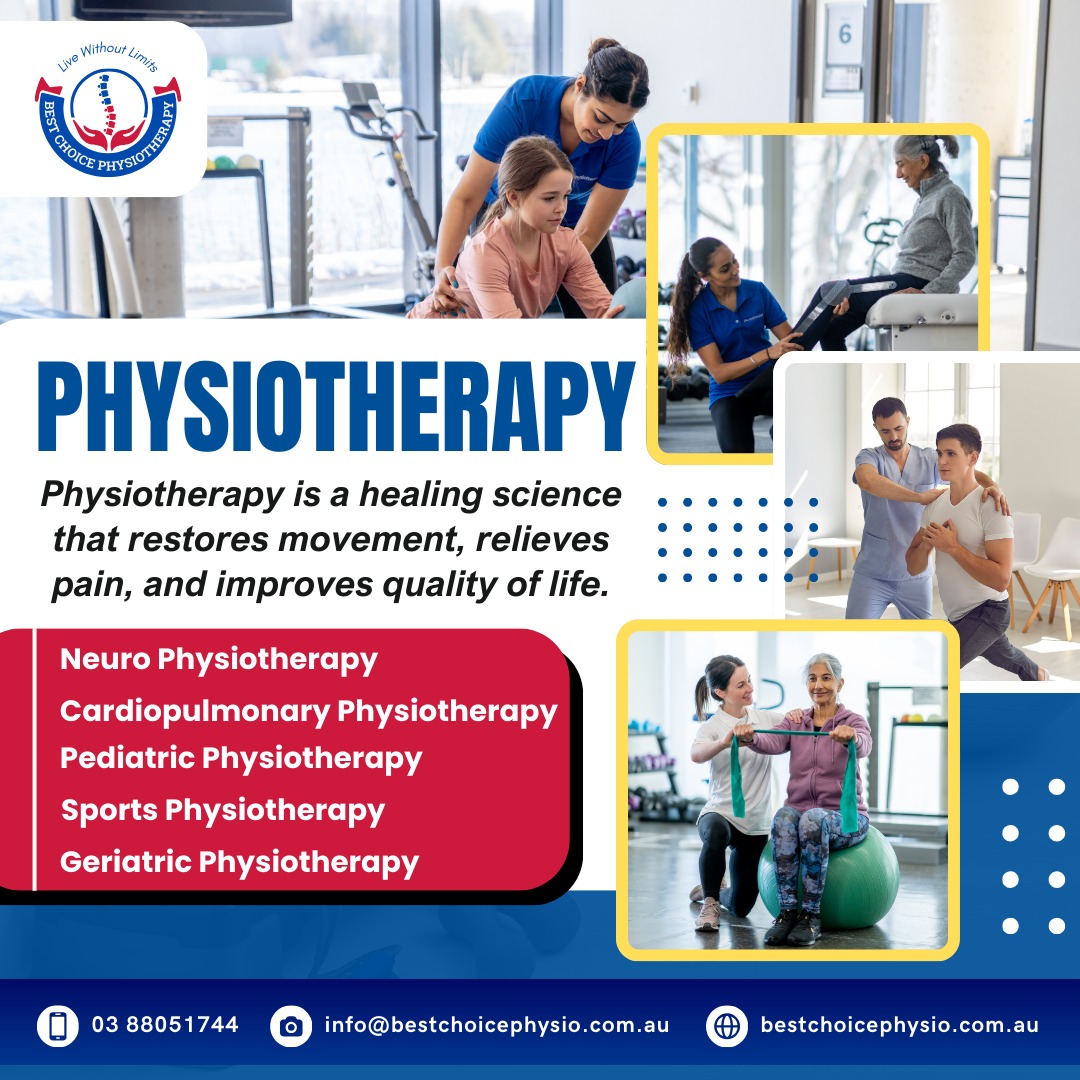Subtotal $0.00
Physiotherapy: Healing Through Movement
In today’s fast-paced world, physical well-being is often compromised by sedentary lifestyles, injuries, or chronic illnesses. That’s where physiotherapy comes in—a science-based profession that helps people restore, maintain, and maximize their physical strength, function, and movement. Whether you’re recovering from a stroke, managing a chronic heart condition, or getting back on the field after a sports injury, physiotherapy plays a crucial role in the journey toward better health.
In this blog, we’ll explore five important branches of physiotherapy: Neuro, Cardiopulmonary, Pediatric, Sports, and Geriatric physiotherapy.
🧠 1. Neuro Physiotherapy: Rewiring the Brain and Body
Neuro physiotherapy focuses on treating individuals with disorders that affect the nervous system. These may include conditions like:
-
Stroke
-
Multiple Sclerosis (MS)
-
Parkinson’s disease
-
Spinal cord injuries
-
Traumatic brain injuries
The goal is to help patients regain mobility and independence by improving muscle strength, coordination, and balance. Neuro physiotherapists use techniques such as functional electrical stimulation, balance training, gait analysis, and task-specific exercises to promote neuroplasticity—the brain’s ability to reorganize itself by forming new connections.
🧩 Fun Fact: The human brain can rewire itself after injury. Neuro physiotherapy taps into this potential!
❤️🩹 2. Cardiopulmonary Physiotherapy: Supporting Heart and Lung Health
Cardiopulmonary physiotherapy helps patients with cardiovascular and respiratory conditions improve their endurance and functional independence. Common conditions treated include:
-
Chronic Obstructive Pulmonary Disease (COPD)
-
Asthma
-
Post-heart attack recovery
-
Post-cardiac surgery rehabilitation
-
Cystic fibrosis
This form of therapy involves breathing exercises, chest physiotherapy, aerobic conditioning, and education on energy conservation techniques. The focus is on improving lung capacity, oxygen intake, and overall cardiovascular endurance.
💡 Tip: Even simple breathing techniques can dramatically enhance your lung function over time!
🧸 3. Pediatric Physiotherapy: Helping Little Bodies Grow Strong
Children with developmental, neuromuscular, or skeletal conditions benefit from pediatric physiotherapy. It is tailored to assist with:
-
Cerebral palsy
-
Developmental delays
-
Muscular dystrophy
-
Down syndrome
-
Congenital disorders
Therapists use play-based therapy, stretching, motor learning, and family-centered care to support a child’s physical and cognitive growth. Early intervention can significantly impact long-term outcomes, improving posture, balance, and motor skills.
🎈 Did You Know? Pediatric physiotherapists often turn therapy into fun games to keep children motivated.
⚽ 4. Sports Physiotherapy: Getting Athletes Back in the Game
Sports physiotherapy is dedicated to athletes and individuals who sustain sports-related injuries such as:
-
Sprains and strains
-
Ligament tears (e.g., ACL)
-
Tendinitis
-
Shin splints
-
Concussions
This branch not only focuses on rehabilitation but also injury prevention and performance enhancement. Treatment often includes strength training, manual therapy, taping techniques, and return-to-sport testing.
🏋️ Quote to remember: “You don’t have to be injured to see a sports physio—prevention is performance!”
👵 5. Geriatric Physiotherapy: Caring for Aging Bodies
As we age, our body undergoes changes that can lead to decreased mobility, balance issues, or chronic pain. Geriatric physiotherapy addresses these age-related conditions such as:
-
Arthritis
-
Osteoporosis
-
Balance disorders
-
Post-surgical recovery (e.g., hip/knee replacements)
-
Alzheimer’s and Parkinson’s disease management
Therapists create gentle exercise programs that focus on improving flexibility, mobility, and safety to prevent falls and maintain independence.
🦯 Insight: Regular physiotherapy can reduce the risk of falls—the leading cause of injury in older adults.
💬 Why Physiotherapy Matters
Physiotherapy is not just about recovery—it’s about empowerment. It’s a proactive approach to health, helping people of all ages improve their quality of life. Whether you’re recovering from a health setback or simply looking to move better and feel stronger, physiotherapy offers personalized care tailored to your goals.
🌿 Final Thoughts
From neuro rehab to senior care, physiotherapy plays a vital role in every phase of life. It bridges the gap between medical intervention and long-term wellness. As awareness grows, so does the appreciation for this invaluable field of healthcare.
👣 Take the first step—because every movement matters.
📞 Call: 03 88051744
📧 Email: info@bestchoicephysio.com.au
🌐 Website: www.bestchoicephysio.com.au

